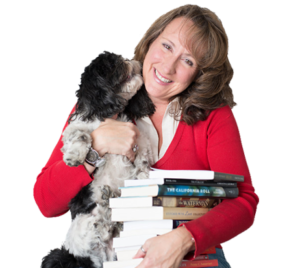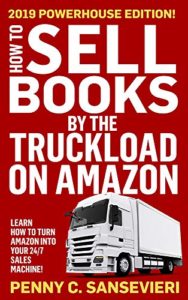 by Penny C. Sansevieri
by Penny C. Sansevieri
The greatest ally for an independent author is their local bookseller. While we’re currently all stuck indoors at the moment due to the spread of COVID-19, this isolation won’t last forever. It’s important to learn tips about maintaining good connections with your local bookstores when the restrictions in your area lift.
Believe it or not, the era of the indie bookstore is BACK! More readers than ever are turning away from large chains. Instead consumers frequent their favorite local bookshops for a more personalized and communal experience.
This means independent bookstores, besides being a fantastic place to shop, have become an incredible tool to help you market your books. Booksellers often act as a guide when customers enter their store, dishing out excellent recommendations and leading readers in the right direction for their taste. That means if you get the attention of your local bookstore, you get the attention of your community.
What Kind of Books Do Indie Bookstores Look for?
It goes without saying that your book should be of the highest quality, with a great book cover, and the title on the spine, with a bar code and an ISBN. Those are the bare necessity for any book ready to reach market.
And while I say that it goes without saying, it’s absolutely worth mentioning. Why? Because there’s no quicker way to lose the interest of a bookstore, than to present them with a poorly done book.
Also, if your book is too old or out of date, it might be tougher to gain bookstore interest, too. Much like any retailer, indie bookstores want something fresh and new.
Indie bookstores look for someone doing their own promotion as well. You can’t rely entirely on the store to do the work. So show them your marketing efforts! If your book has won any awards, be sure to highlight that in your cover letter.
Remember that even though indie bookstores are a great, and often underused target, you’ll still need to sell them on your book.
Pitching to Indie Bookstores
 First you’re going to dig into where these bookstores are in your area. In some cases, you may not have any in your immediate area. However, it’s worth your time looking at adjacent towns. Check out indiebound.org to find bookstores in your area, you might be surprised how many indie bookstores are nearby! Sometimes you’ll find bookstores you didn’t even know about.
First you’re going to dig into where these bookstores are in your area. In some cases, you may not have any in your immediate area. However, it’s worth your time looking at adjacent towns. Check out indiebound.org to find bookstores in your area, you might be surprised how many indie bookstores are nearby! Sometimes you’ll find bookstores you didn’t even know about.
As you explore this directory of stores and begin putting together your list, have a look at the indie bookstore websites and see what their guidelines are for pitching books. Depending on what your book marketing goals are, you may want to pitch only for shelf space.
However, you might want to consider doing book signing events there as well. Most stores offer these guidelines on their website, or a way to contact them so you can get more information. If you don’t find information on the website, call the store and ask for the adult book buyer, or whoever fits your genre. In most cases, you’ll find one person manages all the buying, but this varies from store to store.
As I mentioned in the section above, indie bookstores look for something fresh, new and popular. They don’t want to push a book unless they really think they can sell it. So as you’re pulling together your package to pitch them, make sure and highlight why this book is good for their store. And depending on whether you decide to do a book event, or just ask them to carry the book, your letter and package may be different.
How to Structure Your Pitch
You’ll want to start with a cover letter. Keep it short and to the point. Remember these book buyers or bookstore managers are very busy and likely get pitched a lot. So share only the most important points with them. Things like awards, media you’ve done, or plan to do should be included in your book marketing plan. And, remember to only highlight some of the things you’ve done, and what you plan to do if the book is stocked in their store, or if you do an in-store book event.
If you want to do a book signing event or a talk, outline what you plan to do. Then explain how you plan to promote it to your local media. Bookstores, regardless of their size, may have a mailing list, but they won’t do your book marketing for you. Present them with a plan that addresses how you will help to either drive people into the store, or drive readers to your book signing event. Remember that this is a symbiotic relationship.
Finally, indie bookstores want to know the book is carried by Ingram and the book is returnable. If it’s not, they may ask you to do consignment sales, which I’ll address in a minute.
Use the Local or Seasonal Angle
They say the best way to get someone interested in what you sell, is to sell to people already interested in it. The same goes for indie bookstores. For many stores, there’s a strong appeal to carry books by local authors. As well, you may have a book that ties into something seasonal, like Christmas or back to school.
If you do pitch around seasonal times, stay mindful of the fact that most indie bookstores fill their shelves early. So showing up a week before Christmas and hoping to get your book stocked, isn’t only bad book marketing, but by then bookstores are so frantic with buyers and last minute sales, they probably won’t even consider your book till February. The takeaway? Start pitching early!
Check out Penny’s List of Observances for July
Different Bookstore Events
If you pitch indie bookstores for an event, they may offer you the option to participate in a “local author” event. And while I love these in theory, there are a few things to look out for.
Local author events sometimes focus on any author locally, regardless of the genre. Because these events are focused on a variety of books, you might not actually be targeting readers interested in your subject matter. While it may be good experience, and a great chance to connect with other local authors, you often don’t sell a lot of books at these events.
If you’re doing a local author event, I suggest looking for events that are, at least, similar in genre. So all nonfiction authors are fine or mystery across different sub-genres (like legal thriller, cozy mystery, etc.). Remember you don’t want to try to sell a dog to a cat person, the same is true for your book. Most mystery readers won’t cross over into romance and vice versa.
Sales in Indie Bookstores and Specialty Stores
Whenever I sell books to indie bookstores, or other specialty stores, I find traditional ways of selling don’t always work. If someone asks you to do consignment, turn it down. But I also don’t go into it blindly.
While indie bookstores don’t want to rip you off, you should also protect yourself by making sure you get the terms in writing. Generally I send a very brief letter of agreement that indicates the number of books I’m sending them, and what their percentage is. Most bookstores have this already, especially if they do a lot of consignment. But have one ready just in case.
Benefits of Local Events & Locally Stocked Books
I love local media, it’s overlooked by many authors. It can be a great way to build a readership in your community. It’s also a fabulous way to get your feet wet in media, if you haven’t done interviews or worked with any media before. When it comes to a solid book marketing plan, local media should be at the top of your list.
The only challenge is that it’s easier to get local media if there’s a local tie-in. So, for example, if your book is stocked locally, share that with the media you pitch, or if you have an upcoming event to drive people to.
If you build a relationship with an independent bookstore in your community, make sure to nurture it. Use that momentum to reach out to local media sources, and let them know the places where they can purchase your book. Maybe list the store on your website, let interested readers know where they can walk in and buy your book. This helps the local bookstore, and it helps you sell more books. It’s a relationship that benefits both parties.
If I’m honest, book marketing at the core is about the relationships you build. One of the best relationships you have as a writer, is with your local independent bookstore.
Penny Sansevieri, CEO and founder of Author Marketing Experts, Inc. (AME) and an adjunct professor at NYU, is a best-selling author and internationally recognized book marketing and media relations expert. Her company is one of the leaders in the publishing industry and has developed some of the most cutting-edge book marketing campaigns.
